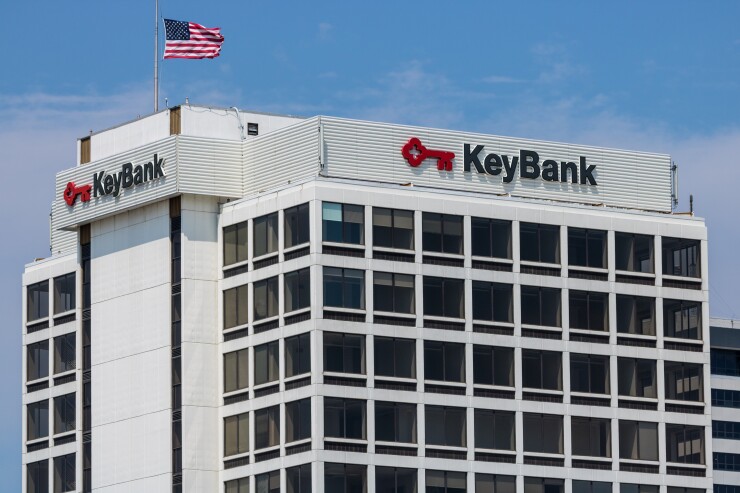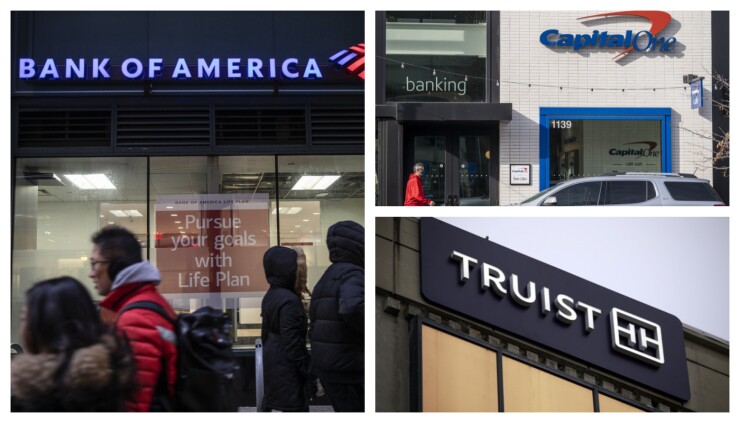KeyCorp is betting that it can offset lower overdraft-related revenue by building out its customer base.
The Cleveland-based company said Thursday that starting in the fourth quarter, it will lose about $25 million per quarter in deposit service fee income as a result of overdraft changes it announced earlier this year.
But Key is making "tangible progress" toward reaching three benchmarks it has set for attracting new clients and doing more business with its existing customers, CEO Chris Gorman told analysts.

Those goals, which Key laid out at its investor day in March, are to grow retail relationship households by 20%, boost the number of commercial and investment bankers by 25% and achieve a fivefold increase in the number of Laurel Road households. Laurel Road, Key's digital bank for doctors, dentists and nurses, had about 48,000 households in 2021, and the bank is looking to raise that number to 250,000.
The lost overdraft-related fee income is "revenue that we'll have to make up elsewhere by continuing to grow the business in areas where we can grow it, and that's mainly by growing our customers," Gorman said in an interview following the company's third-quarter earnings call.
Key did not provide numbers to show that "tangible progress" is underway. Gorman told analysts that the company is "on pace to achieve all three measures" by 2025, though he also noted that there has been a bit of slowdown in banker hiring due to market uncertainty.
KeyCorp, the $190.1 billion-asset parent company of KeyBank, is one of a small number of banks that have talked about how they plan to compensate for the reduction in fee income that has followed the
In January, Citizens Financial Group
The same month, Regions Financial in Birmingham, Alabama, said it expected to
Key
In addition to eliminating nonsufficient funds fees, Key cut the price of an overdraft fee from around $33 to $20 and reduced the maximum number of overdraft charges that customers can incur daily from five to three. The bank also said client accounts that are overdrawn by $20 or less at the end of the day won't be charged overdraft fees.
In 2019, Key's consumer overdraft-related charges totaled $148.6 million, according to data from the bank's call reports. That figure declined substantially to $101.7 million in 2020 as banks including Key waived such charges during the first year of the pandemic, then rose to $116.3 million last year.
The full impact of Key's changes isn't yet showing up on the deposit service charges line of the company's income statement. For the third quarter, such charges totaled $92 million, up from $91 million during the same quarter last year, but down $4 million from the second quarter of this year.
Overall, noninterest income fell 14.3% from the third quarter of 2021 to $683 million, Key said Thursday. The drop included a 57.6% reduction in consumer mortgage income, which was impacted by lower gain on sale margins, and a 34.5% decrease in investment banking and debt placement fees.
The
For the third quarter, Key reported net income of $513 million, down 16.7% from the year-ago period. Earnings per share totaled 55 cents, three cents short of the average estimate of analysts polled by FactSet Research Systems.
Noninterest expenses of $1.1 billion were roughly flat compared with the same quarter in 2021.

Key projected those costs will rise 1% to 3% during the fourth quarter. The forecast is based on expectations of higher incentive compensation due to a pickup in investment banking activity, as well as a combined $20 million of one-time charges related to a pension settlement and building consolidation expenses, Chief Financial Officer Donald Kimble said.
The projected increase in expenses took some analysts by surprise Thursday, but Kimble said the company remains "very focused on driving positive operating leverage" going forward.
"We expect to do that this year," Kimble said during the call. "And we haven't given guidance for 2023 or beyond yet, but we expect to continue that through the next several years as well."





